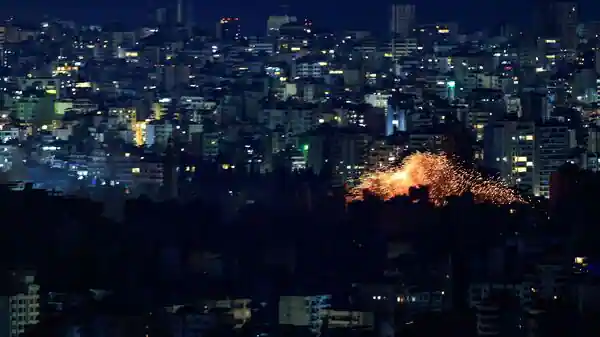
The long-running Israel-Hezbollah conflict has taken a dramatic turn as Israeli missiles target the heart of Beirut, Lebanon’s capital. The latest airstrikes, which hit the Basta neighborhood in central Beirut, mark a significant escalation in a year-long conflict between Israel and Hezbollah, the Lebanese militant group. As tensions soar, both sides continue to exchange fire, with heavy casualties reported on both sides.
Israel Escalates Military Campaign in Beirut
Early on Saturday, Israel launched airstrikes on the Basta district of Beirut, targeting Hezbollah strongholds. At least four missiles were fired, resulting in a massive explosion that shook the capital around 4 am local time (0200 GMT). The attack destroyed an eight-storey building, and several other structures were severely damaged, with images from Lebanon’s Al Jadeed station showing widespread destruction.
The airstrikes are part of a broader Israeli military campaign that began in September and has since intensified. Israel’s offensive is focused on southern Lebanon, where Hezbollah maintains strong influence, as well as areas such as the Bekaa Valley, known for housing Hezbollah leaders. The conflict has taken on a new dimension since Hezbollah’s support for Hamas during the October 7 Gaza war, when Hezbollah launched rocket attacks on northern Israel.
Conflict Background: Hezbollah’s Involvement in Gaza War
The conflict between Israel and Hezbollah reached new heights after Hezbollah launched rockets into northern Israel, offering its solidarity with Hamas and Palestinians in the wake of Hamas’ attack on southern Israel in October 2023. This marked the beginning of cross-border hostilities between the two forces, which have since escalated into full-blown airstrikes and rocket fire exchanges.
The recent Israeli airstrikes targeting Hezbollah’s strongholds in Beirut and southern Lebanon have come after months of hostilities, beginning in earnest in September. Israel’s military has intensified its operations in the region, pounding Hezbollah positions with airstrikes and mobilizing troops along the northern border.
Damaging Strikes: Casualties and Destruction in Beirut
The Israeli airstrike that hit Basta early Saturday resulted in widespread devastation. Witnesses reported a violent blast, with rubble and dust filling the streets of central Beirut. According to Lebanon’s National News Agency, the strike destroyed an eight-storey building, with nearby structures also suffering heavy damage.
The blast has left several residents injured, and emergency crews continue to search through the wreckage for survivors. This attack marks the fourth Israeli strike this week on central Beirut, targeting areas previously not hit as hard as Hezbollah-controlled southern suburbs.
In the Ras al-Nabaa district of central Beirut, an Israeli airstrike earlier this week killed a Hezbollah media official, further heightening tensions. Israel’s targeting of key Hezbollah figures in Beirut has added a new dimension to the ongoing conflict, which remains volatile despite diplomatic efforts.
U.S. Mediation Efforts: A Path Toward Ceasefire?
Amid the growing violence, U.S. mediator Amos Hochstein recently traveled to Lebanon and Israel in an attempt to broker a ceasefire. After meetings with Lebanese officials in Beirut, Hochstein traveled to Tel Aviv to meet Israeli Prime Minister Benjamin Netanyahu and Defense Minister Israel Katz. Initial reports suggest that progress was made in the talks, but no concrete ceasefire agreement has been reached yet.
The U.S. intervention comes after a year of cross-border clashes between Israel and Hezbollah, which have intensified in recent months due to the ongoing Gaza war and Hezbollah’s involvement. The United States has urged both parties to de-escalate, but with both sides entrenched in their positions, the conflict remains far from resolution.
The Broader Impact of the Israel-Hezbollah Conflict
The ongoing conflict has far-reaching implications, not only for Israel and Lebanon, but for the broader Middle East region. The violence has fueled sectarian tensions and strained relations between Lebanon’s Shia and Sunni communities. The humanitarian toll continues to rise, with civilians caught in the crossfire of a war that has brought destruction and death to both sides.
Israel’s military operations in Lebanon have caused significant infrastructure damage, while Hezbollah’s rocket attacks have disrupted life in northern Israel, especially near the border. The civilian casualties and property damage on both sides are significant, as both Israel and Hezbollah target strategic positions, military bases, and infrastructure.
The Road Ahead: Will Tensions Subside?
Despite international pressure for a ceasefire, the conflict remains at a high intensity. Both Israel and Hezbollah continue their military operations with no signs of retreat. For now, the situation remains highly volatile, with the potential for further escalation if diplomatic efforts fail. While a ceasefire may provide temporary relief, the underlying tensions between Israel and Hezbollah remain unresolved, and the prospects for long-term peace in the region appear uncertain.


